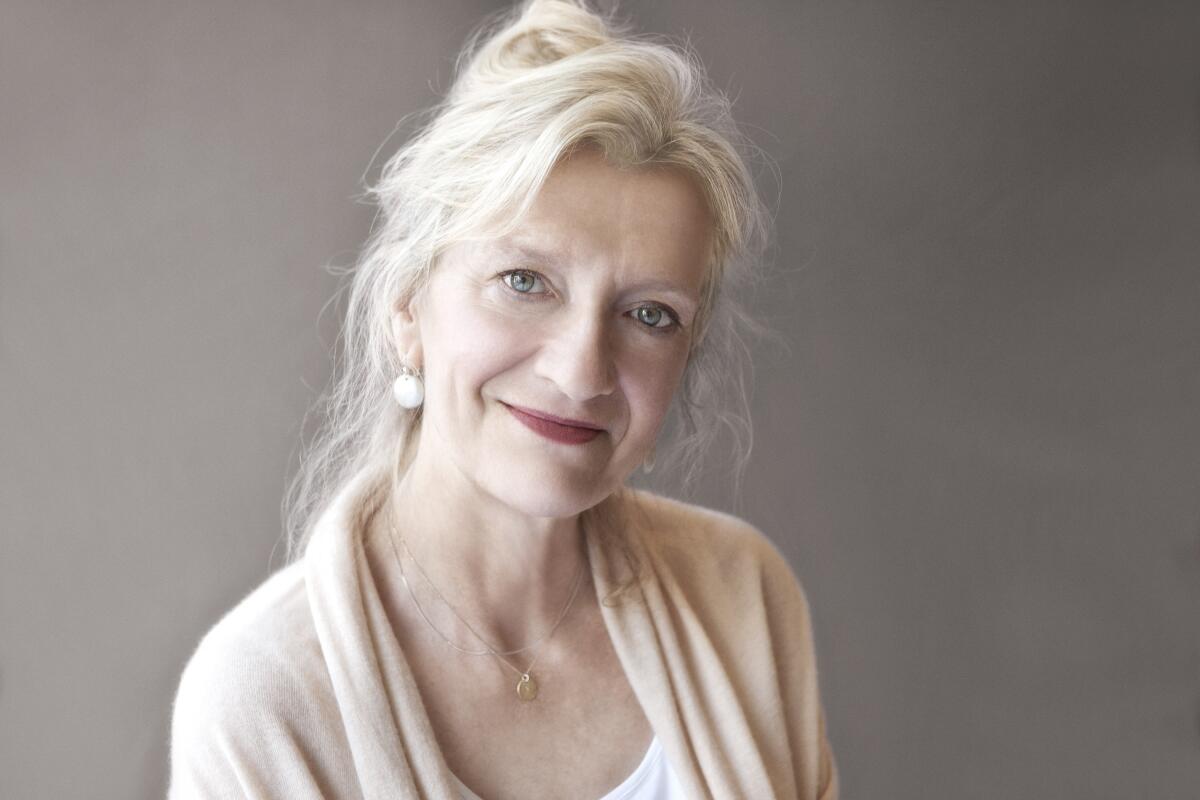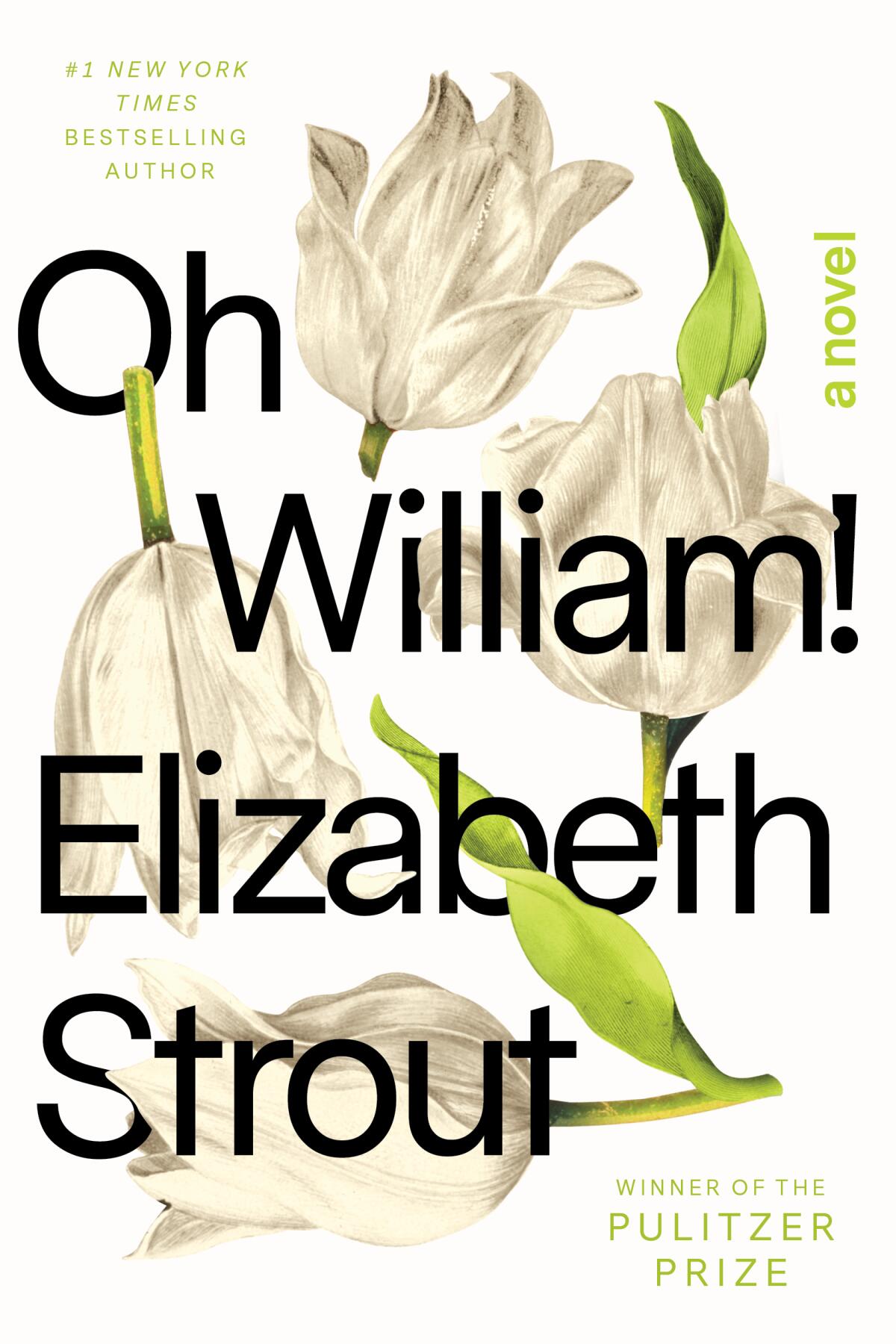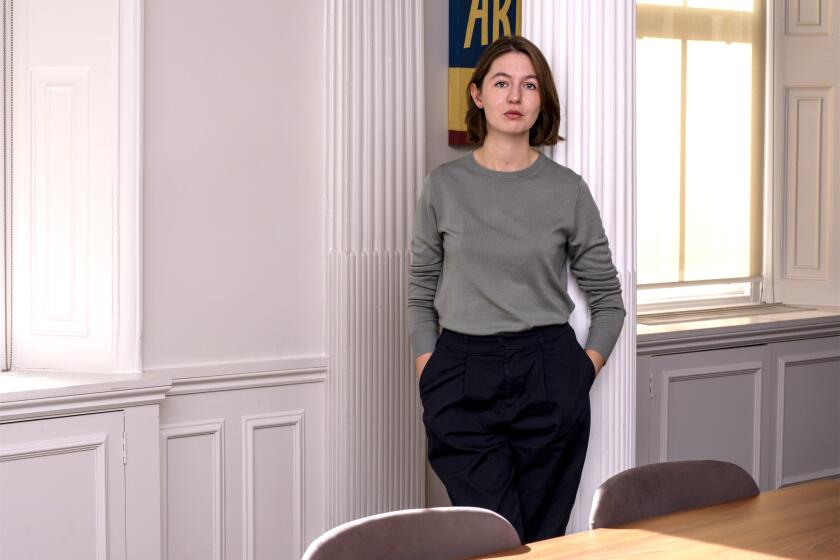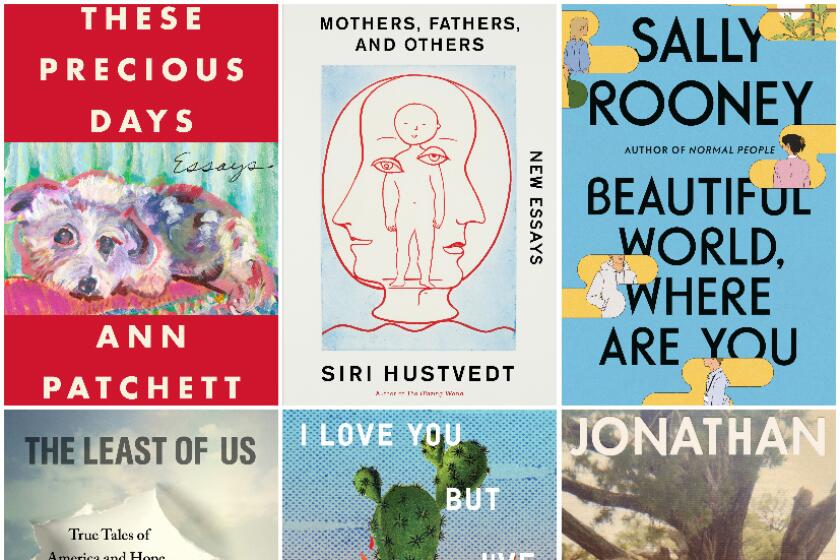Review: How Elizabeth Strout’s simplicity runs rings around more pyrotechnic novelists

- Share via
On the Shelf
Oh William!
By Elizabeth Strout
Random House: 256 pages, $27
If you buy books linked on our site, The Times may earn a commission from Bookshop.org, whose fees support independent bookstores.
I imagine Elizabeth Strout scrawling out her novels longhand in some serene room in coastal Maine, a party of white pines standing tall outside her window. There is a quietude to her prose — even with scowly, persnickety characters like Olive Kitteridge — that exudes calm devotion. Even in her novels’ darkest moments, there’s a soft, periwinkle feeling.
Where a simple phrase will do, it does: “I was so happy.” “Oh he is just so lonely!” “What a strange thing life is.” Lucy Barton in particular, the narrator — again — of Strout’s new novel, “Oh William!,” announces her reactions with the vocabulary of, well, a regular person. Her exclamation points (there are many) are the little stabs of intensity our emotions cycle through each day. Strout doesn’t dress language up in a tuxedo when a wool sweater will suffice. Other novelists must berate themselves when they see what Strout pulls off without any tacky pyrotechnics. Straightforward goes down so easy and feels so refreshing.
All of which makes reading “Oh William!” like coming home to a sensibility that is so smartly deployed it might go unnoticed. This is the third in a series of novels (following “My Name Is Lucy Barton” and “Anything Is Possible”) revolving around the Illinois-born daughter of emotionally unreachable parents, raised in an unheated garage but now ensconced among the fruits of success as a novelist in New York City. (This may be the only novel about a novelist that does not remotely concern itself with her writing, publishing or craft.)
But we shouldn’t call this a trilogy. “Anything Is Possible” was no sequel, but a series of stories building a larger universe for the first novel. “Oh William!,” in turn, is more like the next row of stitches in a knitted blanket; new patterns arise, but the overall effect is of a world filling in, growing at once larger and more intricate. “Trilogy” implies momentum, but Strout keeps looping back to find more, more, more in the recesses.
Rooney’s ballyhooed third novel, “Beautiful World, Where Are You,” has it out over whether Sally Rooney deserves to write bestselling fiction.
This novel is set a few years after the events recounted in “My Name Is Lucy Barton.” (To add a layer of slight complication, that story was set in the mid-1980s but narrated some 20 years later.) Lucy’s second husband, David, has died, and she finds herself drawn to the familiarity of her first husband, William — his capable scientific mind, his confidence in moving through the world — though he is now married for a third time.
Strout’s plain style voids the soap-operatic potential of this description. Lucy’s grief surges and recedes, but her attention is fixed on Willliam’s difficulties: Shortly after his wife, Estelle, unexpectedly departs their marriage, he discovers that his mother had abandoned a child before he was born. “Wait,” Lucy asks when he calls her to come see his suddenly half-empty apartment, “She took the rugs?” Williams nods. “God. My God.” This is a level of treachery that knocks Lucy nearly as much as William.

Loneliness and longing were Strout’s big themes in “Lucy Barton” and its followup. She returns to them here like a supplicant at her prayer book: begging to understand them even just a little bit more. In that first novel, as the writer lies in a hospital bed suffering from a vague internal ailment, her mother comes to stay for five days. She tells stories about the townspeople of Amgash, Ill., who had mostly scorned and belittled the poor, isolated Barton family. (We learn more about their alienation, from their neighbors and each other, in “Anything Is Possible.”) The subtext is everything Lucy and her mother don’t say to each other: about their shivering poverty; Lucy’s father’s ugly, masturbatory outbursts; the dim looks where warm hugs ought to have been. Love — a word hardly uttered — covers them like a clear glaze, enveloping but nearly invisible.
The Lucy of “Oh William!” has not evolved beyond her lonely childhood — most of us don’t. On a trip to Maine to help William find his long-lost half-sister, she looks out the window and takes in the wide-open road, the scrub of trees. She senses the pall of a familiar emptiness — and panics. “Oh I wish I had not come!” she thinks. “I am afraid of things that are not familiar.” William’s response is “cold to [her] ears” and she tailspins further. “Oh, to panic! If you have not been there, you cannot know.”
Their marriage-cum-friendship is marked by ambivalence, mutability. “At times in our marriage I loathed him,” Lucy remarks. “I saw, with a kind of dull disc of dread in my chest, that with his pleasant distance, his mild expressions, he was unavailable.” But now they talk often, meet at a local diner for breakfasts, confide. Lucy calls William first when her second husband dies: “Oh William, help me.”
Sally Rooney, Anthony Doerr, Maggie Nelson, Richard Powers, Jonathan Franzen — the list goes on. Four critics on kicking off a big, bookish fall.
There is a built-in tether binding some relationships, Strout suggests, like the “invisible threads” Virginia Woolf spun out across London to keep her characters connected in “Mrs. Dalloway.” The best moments in the novel are the sudden knocks Lucy feels when her thread to William twangs — that yank of disassociation we feel when we realize that to be human is to be alone.
Strout does very little here that is new, and that is a notion to celebrate. I hate writing that she tells “small” stories, because criticism of fiction by women is filled with such dismissive implications: It’s lovely of women to write these dainty little tales of domesticity and woe — pat pat pat on the head. But smallness is Strout’s strength. Her stories don’t need to be grand because human experience is largely not; it is lived on the level of the daily, the conversational, the gestural. There is wonder enough in the silence between two people to fill books even longer than these.
Which isn’t to say Strout doesn’t have a cosmic point of view. Her novels are universal, though they aren’t big or broad or grasping, like the surfeit of literary fiction that needs to announce its own importance via page count or character sprawl. Read “Oh William!” for its suggestions about how the economics of our childhood never leave us. (In the first novel, Lucy is blown away by an artist who can afford shirts from Bloomingdale’s; in this novel she lunches there regularly but never forgets her earlier self.) Read it for Strout’s careful revelations of the sandblasting of rural America after World War II.
Oh! And read it for the copious exclamation points. They’re the only ones in modern fiction I can stand.
His new novel, ‘Crossroads,’ is extraordinary, immersive, even fun. But it makes you wonder what Franzen might accomplish if more were at stake
Kelly’s work has been published in New York magazine, Vogue, the New York Times Book Review and elsewhere.
More to Read
Sign up for our Book Club newsletter
Get the latest news, events and more from the Los Angeles Times Book Club, and help us get L.A. reading and talking.
You may occasionally receive promotional content from the Los Angeles Times.











